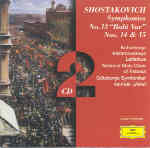Neeme Järvi leads Babi Yar with his characteristic alacrity and intensity. The performance has a notable lightness of utterance and an overall sharp-edged quality that can sound somewhat facile next to such grim-countenanced renditions as Haitink’s and especially Barshai’s, whose dark, brooding orchestral coloring and robust choral singing projects the music’s anger as few readings have. Still, Järvi’s taut, imaginative conducting and the Gothenburg Symphony’s lively playing gives the music–especially the first, third, and fourth movements–a sinister edge that creates an unmistakable sense of uneasiness. That alone makes his performance worth hearing.
In Symphony No. 14 Järvi artfully balances the elements of gloom, defiance, and resignation that make up this stark yet at times serene work. Ljuba Kazarnovskaya and Sergei Leiferkus are up to the challenges of the more violent and vitriolic songs (Malagueña and At the Santé Jail), but they also sing with real tenderness in Shostakovich’s poignant moments of reflection (The Suicide and O Delvig, Delvig!). Nonetheless, Rostropovich’s enthralling rendition, with the riveting and near-fanatical singing of Galina Vishnevskaya and Mark Reshetin, is the recording to have before any others.
Best is Symphony No. 15. Järvi ideally captures the first movement’s mocking spirit, then turns on a dime to project the slow movement’s initial dour despair, which then unleashes a musical torrent unrelenting in its ferocity. The Gothenburg Orchestra provides impassioned and sonorous playing from every section, just as it does in the mirror-image finale. This is a viscerally affecting, memorable performance, captured in vivid, well-balanced sound by DG. Yes, there are finer individual readings, but you’ll not find a collection of this quality at a two-for-one price. As such, Shostakovich fans should consider this a treat. [11/5/2003]
































